Analysis of Corporate Social Responsibility: A Philosophy Essay
VerifiedAdded on 2022/08/23
|10
|2491
|14
Essay
AI Summary
This essay delves into the multifaceted concept of corporate social responsibility (CSR) from a philosophical perspective, examining the obligations of corporations towards their stakeholders. It begins by outlining the responsibilities of corporations to society, emphasizing job creation, safe working environments, customer satisfaction, environmental protection, and transparency. The essay then analyzes the CSR views of prominent critics such as Milton Friedman, exploring his argument against CSR as a hindrance to profit maximization. It also examines stakeholder perspectives by Evan and Freeman, focusing on the instrumental, normative, and descriptive aspects of stakeholder theory, and the CSR views of Kenneth Goodpaster, highlighting the ethical considerations and the 'stakeholder paradox.' The essay concludes by advocating for the accommodating approach to CSR as the most effective way to balance profit-making with social responsibility, aligning with the stakeholder views of Evan and Freeman. The essay provides a comprehensive overview of the debates and approaches to CSR, offering valuable insights into the ethical dimensions of corporate behavior.

Running head: PHILOSOPHY
Philosophy
Name of the Student
Name of the University
Author Note
Philosophy
Name of the Student
Name of the University
Author Note
Paraphrase This Document
Need a fresh take? Get an instant paraphrase of this document with our AI Paraphraser
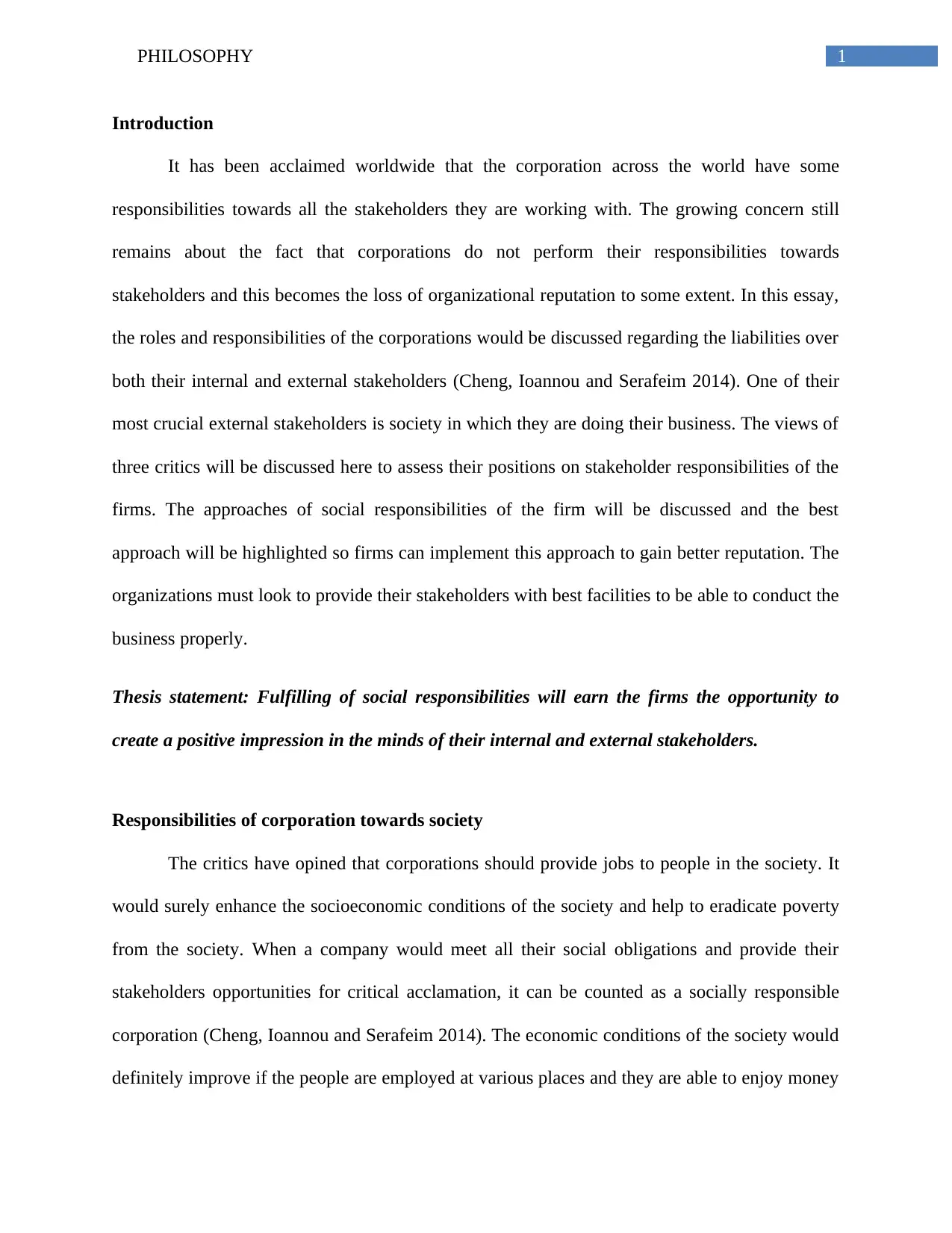
1PHILOSOPHY
Introduction
It has been acclaimed worldwide that the corporation across the world have some
responsibilities towards all the stakeholders they are working with. The growing concern still
remains about the fact that corporations do not perform their responsibilities towards
stakeholders and this becomes the loss of organizational reputation to some extent. In this essay,
the roles and responsibilities of the corporations would be discussed regarding the liabilities over
both their internal and external stakeholders (Cheng, Ioannou and Serafeim 2014). One of their
most crucial external stakeholders is society in which they are doing their business. The views of
three critics will be discussed here to assess their positions on stakeholder responsibilities of the
firms. The approaches of social responsibilities of the firm will be discussed and the best
approach will be highlighted so firms can implement this approach to gain better reputation. The
organizations must look to provide their stakeholders with best facilities to be able to conduct the
business properly.
Thesis statement: Fulfilling of social responsibilities will earn the firms the opportunity to
create a positive impression in the minds of their internal and external stakeholders.
Responsibilities of corporation towards society
The critics have opined that corporations should provide jobs to people in the society. It
would surely enhance the socioeconomic conditions of the society and help to eradicate poverty
from the society. When a company would meet all their social obligations and provide their
stakeholders opportunities for critical acclamation, it can be counted as a socially responsible
corporation (Cheng, Ioannou and Serafeim 2014). The economic conditions of the society would
definitely improve if the people are employed at various places and they are able to enjoy money
Introduction
It has been acclaimed worldwide that the corporation across the world have some
responsibilities towards all the stakeholders they are working with. The growing concern still
remains about the fact that corporations do not perform their responsibilities towards
stakeholders and this becomes the loss of organizational reputation to some extent. In this essay,
the roles and responsibilities of the corporations would be discussed regarding the liabilities over
both their internal and external stakeholders (Cheng, Ioannou and Serafeim 2014). One of their
most crucial external stakeholders is society in which they are doing their business. The views of
three critics will be discussed here to assess their positions on stakeholder responsibilities of the
firms. The approaches of social responsibilities of the firm will be discussed and the best
approach will be highlighted so firms can implement this approach to gain better reputation. The
organizations must look to provide their stakeholders with best facilities to be able to conduct the
business properly.
Thesis statement: Fulfilling of social responsibilities will earn the firms the opportunity to
create a positive impression in the minds of their internal and external stakeholders.
Responsibilities of corporation towards society
The critics have opined that corporations should provide jobs to people in the society. It
would surely enhance the socioeconomic conditions of the society and help to eradicate poverty
from the society. When a company would meet all their social obligations and provide their
stakeholders opportunities for critical acclamation, it can be counted as a socially responsible
corporation (Cheng, Ioannou and Serafeim 2014). The economic conditions of the society would
definitely improve if the people are employed at various places and they are able to enjoy money
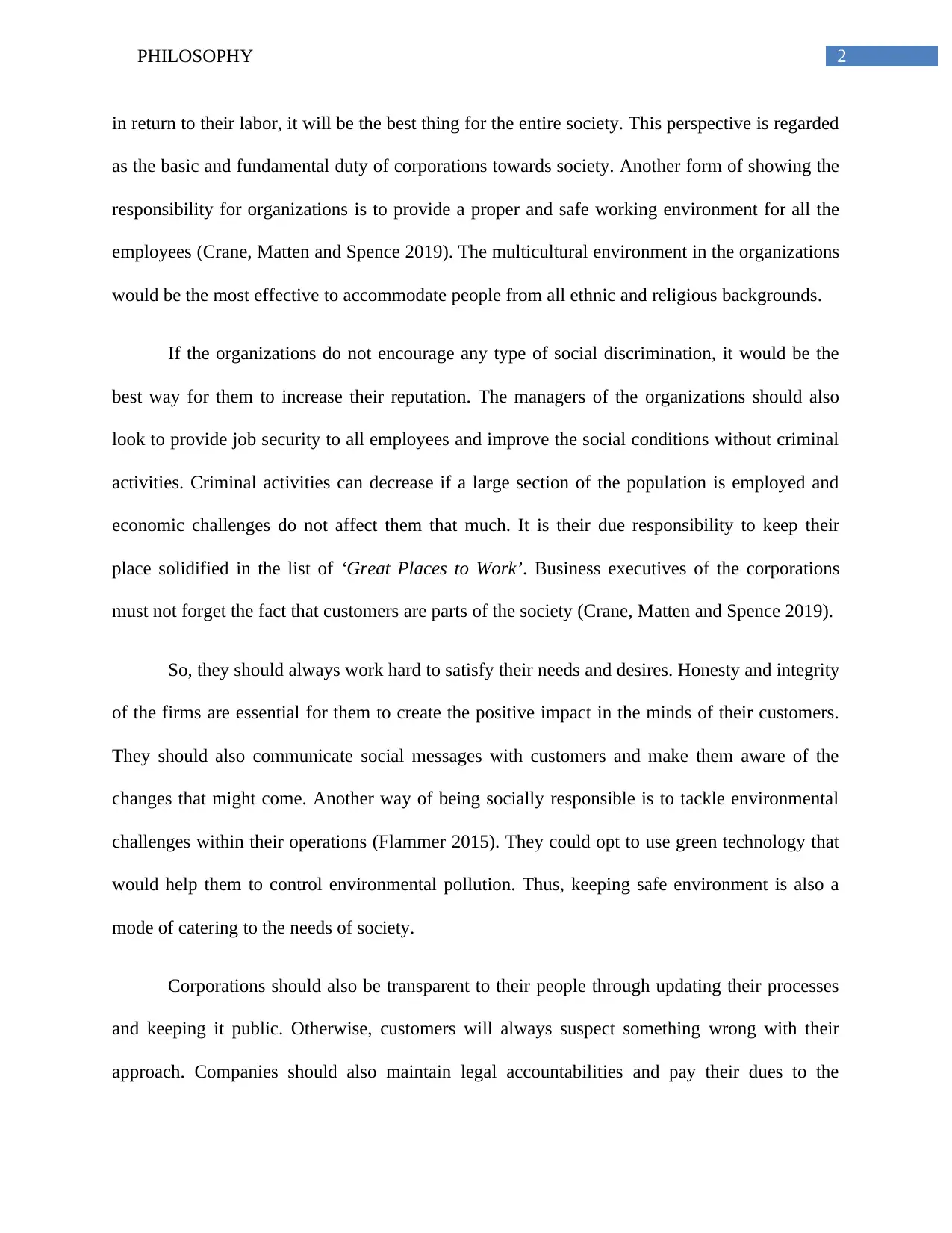
2PHILOSOPHY
in return to their labor, it will be the best thing for the entire society. This perspective is regarded
as the basic and fundamental duty of corporations towards society. Another form of showing the
responsibility for organizations is to provide a proper and safe working environment for all the
employees (Crane, Matten and Spence 2019). The multicultural environment in the organizations
would be the most effective to accommodate people from all ethnic and religious backgrounds.
If the organizations do not encourage any type of social discrimination, it would be the
best way for them to increase their reputation. The managers of the organizations should also
look to provide job security to all employees and improve the social conditions without criminal
activities. Criminal activities can decrease if a large section of the population is employed and
economic challenges do not affect them that much. It is their due responsibility to keep their
place solidified in the list of ‘Great Places to Work’. Business executives of the corporations
must not forget the fact that customers are parts of the society (Crane, Matten and Spence 2019).
So, they should always work hard to satisfy their needs and desires. Honesty and integrity
of the firms are essential for them to create the positive impact in the minds of their customers.
They should also communicate social messages with customers and make them aware of the
changes that might come. Another way of being socially responsible is to tackle environmental
challenges within their operations (Flammer 2015). They could opt to use green technology that
would help them to control environmental pollution. Thus, keeping safe environment is also a
mode of catering to the needs of society.
Corporations should also be transparent to their people through updating their processes
and keeping it public. Otherwise, customers will always suspect something wrong with their
approach. Companies should also maintain legal accountabilities and pay their dues to the
in return to their labor, it will be the best thing for the entire society. This perspective is regarded
as the basic and fundamental duty of corporations towards society. Another form of showing the
responsibility for organizations is to provide a proper and safe working environment for all the
employees (Crane, Matten and Spence 2019). The multicultural environment in the organizations
would be the most effective to accommodate people from all ethnic and religious backgrounds.
If the organizations do not encourage any type of social discrimination, it would be the
best way for them to increase their reputation. The managers of the organizations should also
look to provide job security to all employees and improve the social conditions without criminal
activities. Criminal activities can decrease if a large section of the population is employed and
economic challenges do not affect them that much. It is their due responsibility to keep their
place solidified in the list of ‘Great Places to Work’. Business executives of the corporations
must not forget the fact that customers are parts of the society (Crane, Matten and Spence 2019).
So, they should always work hard to satisfy their needs and desires. Honesty and integrity
of the firms are essential for them to create the positive impact in the minds of their customers.
They should also communicate social messages with customers and make them aware of the
changes that might come. Another way of being socially responsible is to tackle environmental
challenges within their operations (Flammer 2015). They could opt to use green technology that
would help them to control environmental pollution. Thus, keeping safe environment is also a
mode of catering to the needs of society.
Corporations should also be transparent to their people through updating their processes
and keeping it public. Otherwise, customers will always suspect something wrong with their
approach. Companies should also maintain legal accountabilities and pay their dues to the
⊘ This is a preview!⊘
Do you want full access?
Subscribe today to unlock all pages.

Trusted by 1+ million students worldwide
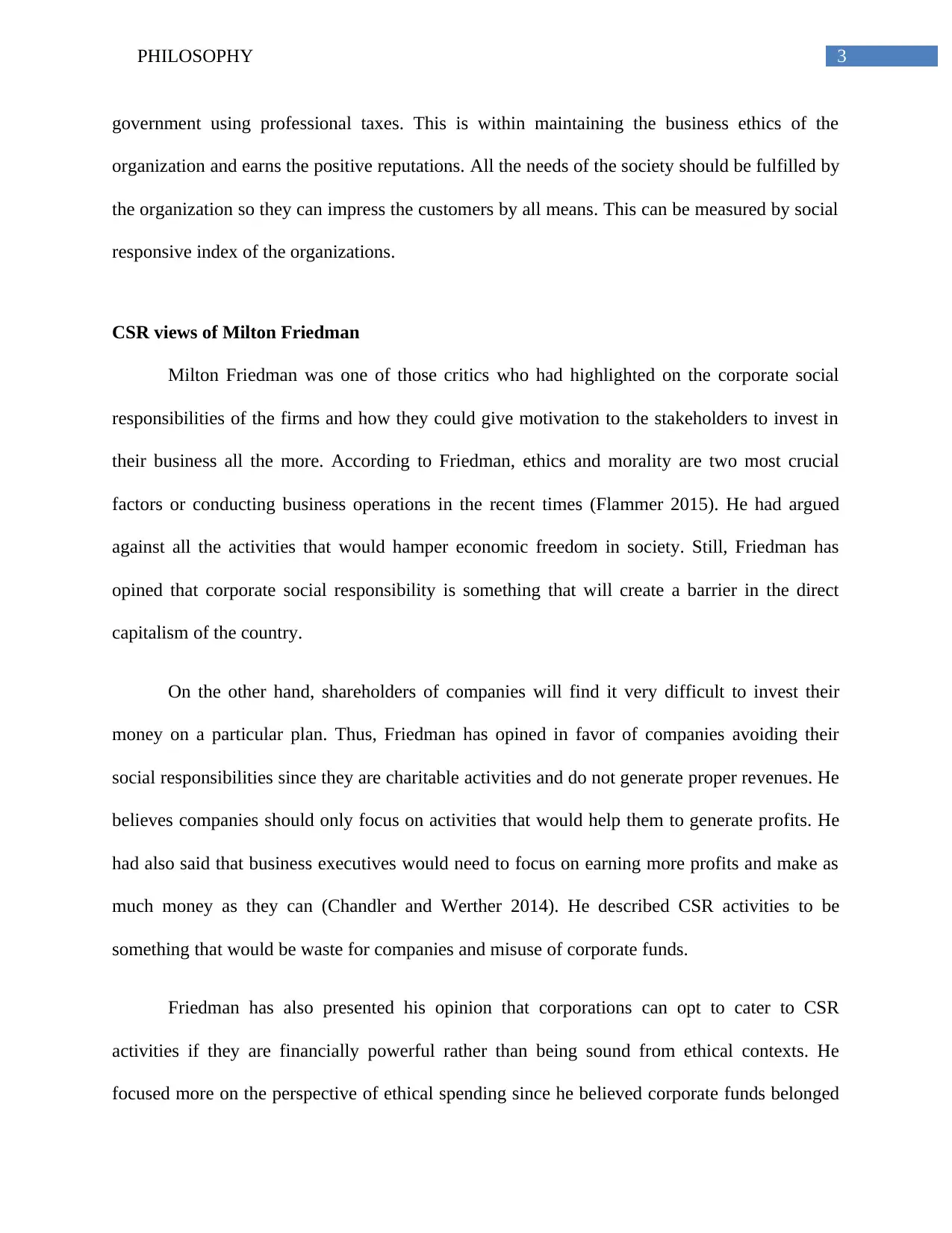
3PHILOSOPHY
government using professional taxes. This is within maintaining the business ethics of the
organization and earns the positive reputations. All the needs of the society should be fulfilled by
the organization so they can impress the customers by all means. This can be measured by social
responsive index of the organizations.
CSR views of Milton Friedman
Milton Friedman was one of those critics who had highlighted on the corporate social
responsibilities of the firms and how they could give motivation to the stakeholders to invest in
their business all the more. According to Friedman, ethics and morality are two most crucial
factors or conducting business operations in the recent times (Flammer 2015). He had argued
against all the activities that would hamper economic freedom in society. Still, Friedman has
opined that corporate social responsibility is something that will create a barrier in the direct
capitalism of the country.
On the other hand, shareholders of companies will find it very difficult to invest their
money on a particular plan. Thus, Friedman has opined in favor of companies avoiding their
social responsibilities since they are charitable activities and do not generate proper revenues. He
believes companies should only focus on activities that would help them to generate profits. He
had also said that business executives would need to focus on earning more profits and make as
much money as they can (Chandler and Werther 2014). He described CSR activities to be
something that would be waste for companies and misuse of corporate funds.
Friedman has also presented his opinion that corporations can opt to cater to CSR
activities if they are financially powerful rather than being sound from ethical contexts. He
focused more on the perspective of ethical spending since he believed corporate funds belonged
government using professional taxes. This is within maintaining the business ethics of the
organization and earns the positive reputations. All the needs of the society should be fulfilled by
the organization so they can impress the customers by all means. This can be measured by social
responsive index of the organizations.
CSR views of Milton Friedman
Milton Friedman was one of those critics who had highlighted on the corporate social
responsibilities of the firms and how they could give motivation to the stakeholders to invest in
their business all the more. According to Friedman, ethics and morality are two most crucial
factors or conducting business operations in the recent times (Flammer 2015). He had argued
against all the activities that would hamper economic freedom in society. Still, Friedman has
opined that corporate social responsibility is something that will create a barrier in the direct
capitalism of the country.
On the other hand, shareholders of companies will find it very difficult to invest their
money on a particular plan. Thus, Friedman has opined in favor of companies avoiding their
social responsibilities since they are charitable activities and do not generate proper revenues. He
believes companies should only focus on activities that would help them to generate profits. He
had also said that business executives would need to focus on earning more profits and make as
much money as they can (Chandler and Werther 2014). He described CSR activities to be
something that would be waste for companies and misuse of corporate funds.
Friedman has also presented his opinion that corporations can opt to cater to CSR
activities if they are financially powerful rather than being sound from ethical contexts. He
focused more on the perspective of ethical spending since he believed corporate funds belonged
Paraphrase This Document
Need a fresh take? Get an instant paraphrase of this document with our AI Paraphraser
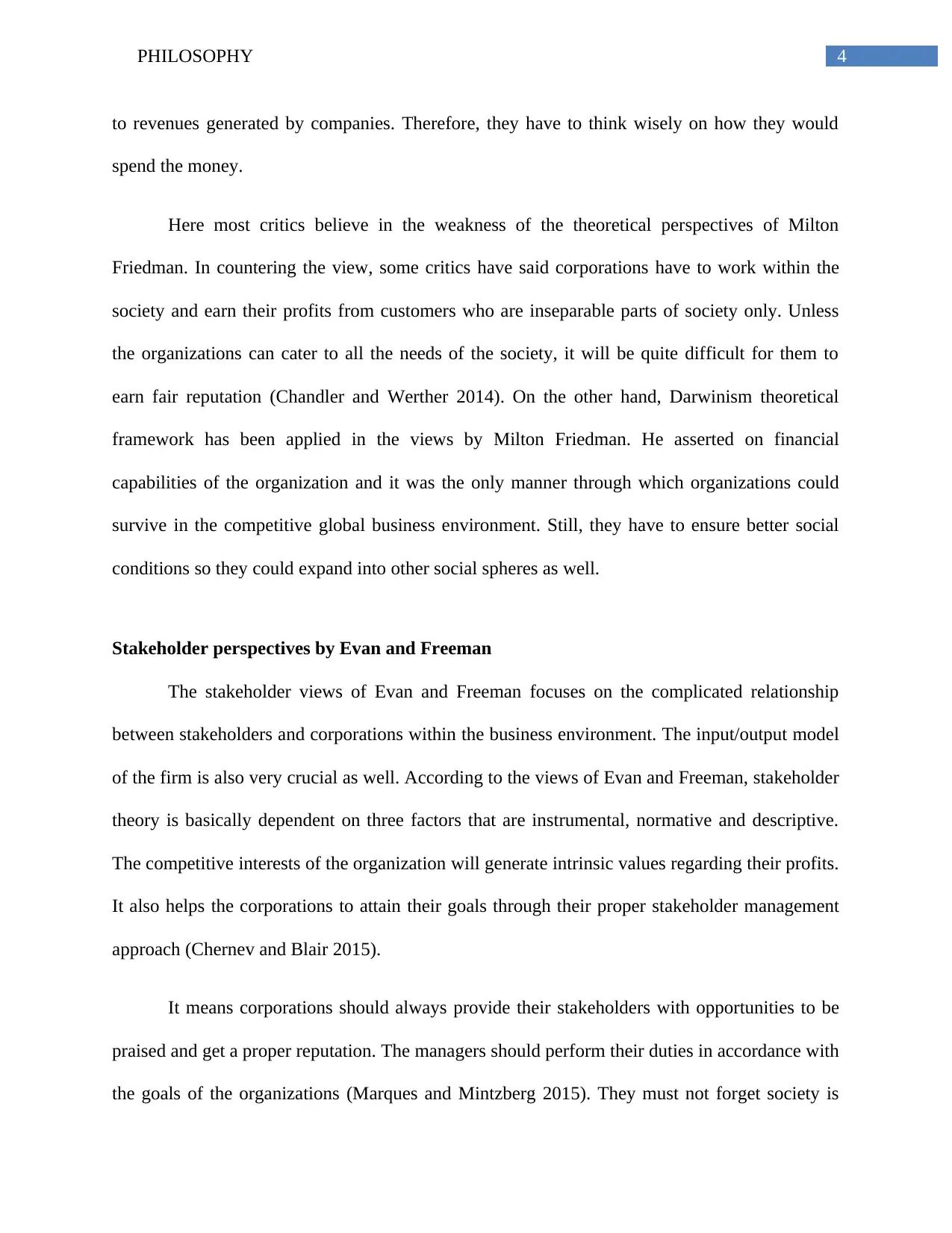
4PHILOSOPHY
to revenues generated by companies. Therefore, they have to think wisely on how they would
spend the money.
Here most critics believe in the weakness of the theoretical perspectives of Milton
Friedman. In countering the view, some critics have said corporations have to work within the
society and earn their profits from customers who are inseparable parts of society only. Unless
the organizations can cater to all the needs of the society, it will be quite difficult for them to
earn fair reputation (Chandler and Werther 2014). On the other hand, Darwinism theoretical
framework has been applied in the views by Milton Friedman. He asserted on financial
capabilities of the organization and it was the only manner through which organizations could
survive in the competitive global business environment. Still, they have to ensure better social
conditions so they could expand into other social spheres as well.
Stakeholder perspectives by Evan and Freeman
The stakeholder views of Evan and Freeman focuses on the complicated relationship
between stakeholders and corporations within the business environment. The input/output model
of the firm is also very crucial as well. According to the views of Evan and Freeman, stakeholder
theory is basically dependent on three factors that are instrumental, normative and descriptive.
The competitive interests of the organization will generate intrinsic values regarding their profits.
It also helps the corporations to attain their goals through their proper stakeholder management
approach (Chernev and Blair 2015).
It means corporations should always provide their stakeholders with opportunities to be
praised and get a proper reputation. The managers should perform their duties in accordance with
the goals of the organizations (Marques and Mintzberg 2015). They must not forget society is
to revenues generated by companies. Therefore, they have to think wisely on how they would
spend the money.
Here most critics believe in the weakness of the theoretical perspectives of Milton
Friedman. In countering the view, some critics have said corporations have to work within the
society and earn their profits from customers who are inseparable parts of society only. Unless
the organizations can cater to all the needs of the society, it will be quite difficult for them to
earn fair reputation (Chandler and Werther 2014). On the other hand, Darwinism theoretical
framework has been applied in the views by Milton Friedman. He asserted on financial
capabilities of the organization and it was the only manner through which organizations could
survive in the competitive global business environment. Still, they have to ensure better social
conditions so they could expand into other social spheres as well.
Stakeholder perspectives by Evan and Freeman
The stakeholder views of Evan and Freeman focuses on the complicated relationship
between stakeholders and corporations within the business environment. The input/output model
of the firm is also very crucial as well. According to the views of Evan and Freeman, stakeholder
theory is basically dependent on three factors that are instrumental, normative and descriptive.
The competitive interests of the organization will generate intrinsic values regarding their profits.
It also helps the corporations to attain their goals through their proper stakeholder management
approach (Chernev and Blair 2015).
It means corporations should always provide their stakeholders with opportunities to be
praised and get a proper reputation. The managers should perform their duties in accordance with
the goals of the organizations (Marques and Mintzberg 2015). They must not forget society is
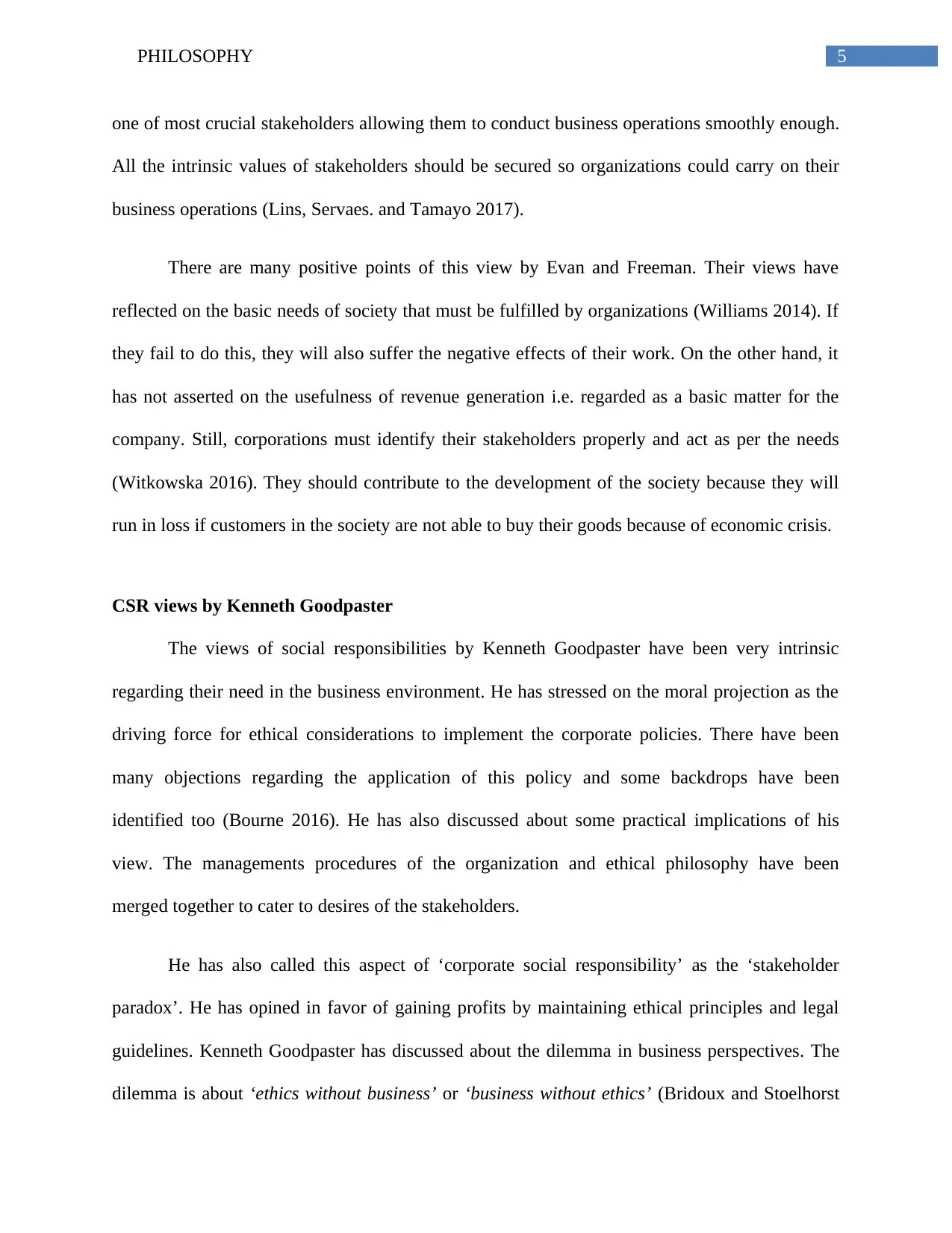
5PHILOSOPHY
one of most crucial stakeholders allowing them to conduct business operations smoothly enough.
All the intrinsic values of stakeholders should be secured so organizations could carry on their
business operations (Lins, Servaes. and Tamayo 2017).
There are many positive points of this view by Evan and Freeman. Their views have
reflected on the basic needs of society that must be fulfilled by organizations (Williams 2014). If
they fail to do this, they will also suffer the negative effects of their work. On the other hand, it
has not asserted on the usefulness of revenue generation i.e. regarded as a basic matter for the
company. Still, corporations must identify their stakeholders properly and act as per the needs
(Witkowska 2016). They should contribute to the development of the society because they will
run in loss if customers in the society are not able to buy their goods because of economic crisis.
CSR views by Kenneth Goodpaster
The views of social responsibilities by Kenneth Goodpaster have been very intrinsic
regarding their need in the business environment. He has stressed on the moral projection as the
driving force for ethical considerations to implement the corporate policies. There have been
many objections regarding the application of this policy and some backdrops have been
identified too (Bourne 2016). He has also discussed about some practical implications of his
view. The managements procedures of the organization and ethical philosophy have been
merged together to cater to desires of the stakeholders.
He has also called this aspect of ‘corporate social responsibility’ as the ‘stakeholder
paradox’. He has opined in favor of gaining profits by maintaining ethical principles and legal
guidelines. Kenneth Goodpaster has discussed about the dilemma in business perspectives. The
dilemma is about ‘ethics without business’ or ‘business without ethics’ (Bridoux and Stoelhorst
one of most crucial stakeholders allowing them to conduct business operations smoothly enough.
All the intrinsic values of stakeholders should be secured so organizations could carry on their
business operations (Lins, Servaes. and Tamayo 2017).
There are many positive points of this view by Evan and Freeman. Their views have
reflected on the basic needs of society that must be fulfilled by organizations (Williams 2014). If
they fail to do this, they will also suffer the negative effects of their work. On the other hand, it
has not asserted on the usefulness of revenue generation i.e. regarded as a basic matter for the
company. Still, corporations must identify their stakeholders properly and act as per the needs
(Witkowska 2016). They should contribute to the development of the society because they will
run in loss if customers in the society are not able to buy their goods because of economic crisis.
CSR views by Kenneth Goodpaster
The views of social responsibilities by Kenneth Goodpaster have been very intrinsic
regarding their need in the business environment. He has stressed on the moral projection as the
driving force for ethical considerations to implement the corporate policies. There have been
many objections regarding the application of this policy and some backdrops have been
identified too (Bourne 2016). He has also discussed about some practical implications of his
view. The managements procedures of the organization and ethical philosophy have been
merged together to cater to desires of the stakeholders.
He has also called this aspect of ‘corporate social responsibility’ as the ‘stakeholder
paradox’. He has opined in favor of gaining profits by maintaining ethical principles and legal
guidelines. Kenneth Goodpaster has discussed about the dilemma in business perspectives. The
dilemma is about ‘ethics without business’ or ‘business without ethics’ (Bridoux and Stoelhorst
⊘ This is a preview!⊘
Do you want full access?
Subscribe today to unlock all pages.

Trusted by 1+ million students worldwide
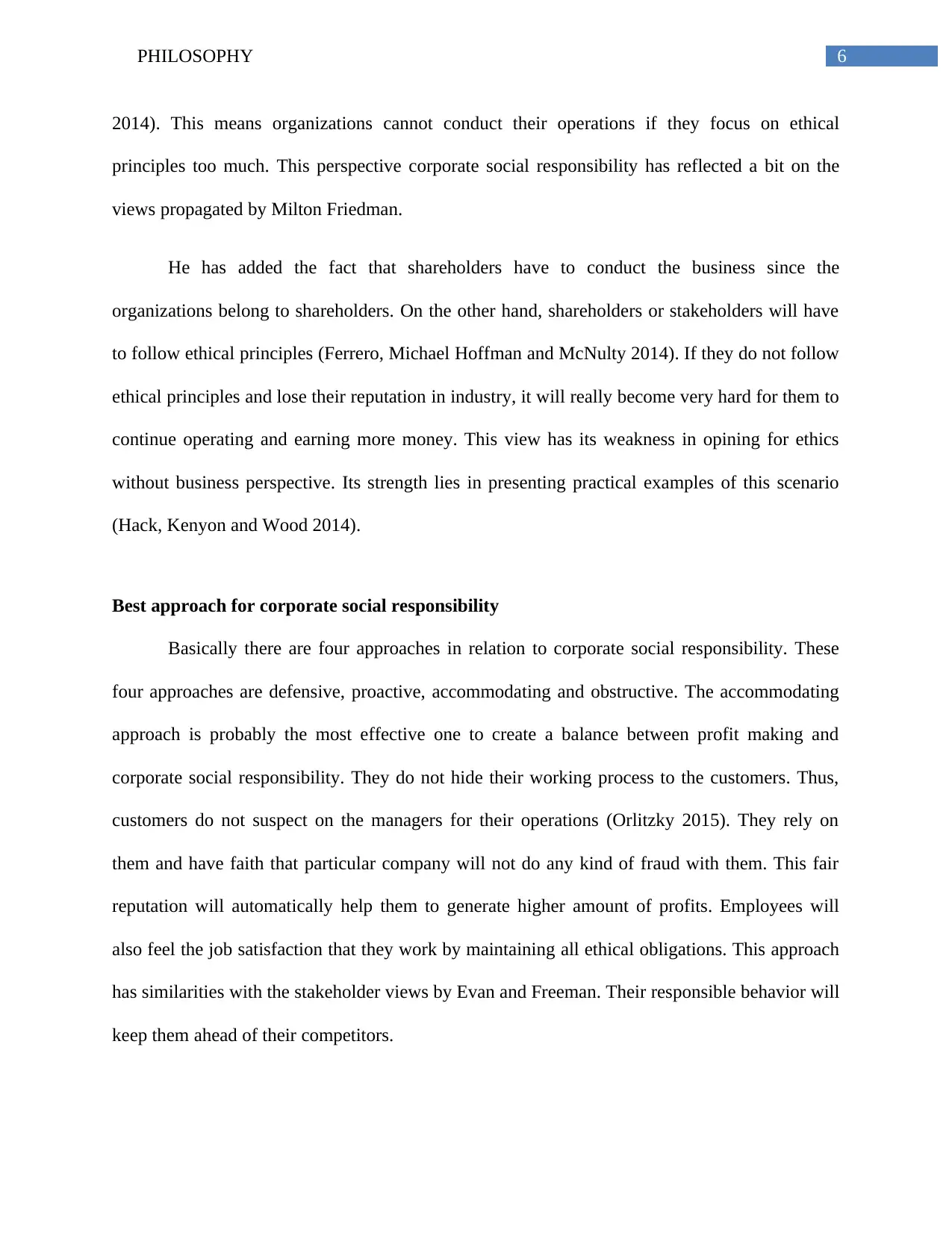
6PHILOSOPHY
2014). This means organizations cannot conduct their operations if they focus on ethical
principles too much. This perspective corporate social responsibility has reflected a bit on the
views propagated by Milton Friedman.
He has added the fact that shareholders have to conduct the business since the
organizations belong to shareholders. On the other hand, shareholders or stakeholders will have
to follow ethical principles (Ferrero, Michael Hoffman and McNulty 2014). If they do not follow
ethical principles and lose their reputation in industry, it will really become very hard for them to
continue operating and earning more money. This view has its weakness in opining for ethics
without business perspective. Its strength lies in presenting practical examples of this scenario
(Hack, Kenyon and Wood 2014).
Best approach for corporate social responsibility
Basically there are four approaches in relation to corporate social responsibility. These
four approaches are defensive, proactive, accommodating and obstructive. The accommodating
approach is probably the most effective one to create a balance between profit making and
corporate social responsibility. They do not hide their working process to the customers. Thus,
customers do not suspect on the managers for their operations (Orlitzky 2015). They rely on
them and have faith that particular company will not do any kind of fraud with them. This fair
reputation will automatically help them to generate higher amount of profits. Employees will
also feel the job satisfaction that they work by maintaining all ethical obligations. This approach
has similarities with the stakeholder views by Evan and Freeman. Their responsible behavior will
keep them ahead of their competitors.
2014). This means organizations cannot conduct their operations if they focus on ethical
principles too much. This perspective corporate social responsibility has reflected a bit on the
views propagated by Milton Friedman.
He has added the fact that shareholders have to conduct the business since the
organizations belong to shareholders. On the other hand, shareholders or stakeholders will have
to follow ethical principles (Ferrero, Michael Hoffman and McNulty 2014). If they do not follow
ethical principles and lose their reputation in industry, it will really become very hard for them to
continue operating and earning more money. This view has its weakness in opining for ethics
without business perspective. Its strength lies in presenting practical examples of this scenario
(Hack, Kenyon and Wood 2014).
Best approach for corporate social responsibility
Basically there are four approaches in relation to corporate social responsibility. These
four approaches are defensive, proactive, accommodating and obstructive. The accommodating
approach is probably the most effective one to create a balance between profit making and
corporate social responsibility. They do not hide their working process to the customers. Thus,
customers do not suspect on the managers for their operations (Orlitzky 2015). They rely on
them and have faith that particular company will not do any kind of fraud with them. This fair
reputation will automatically help them to generate higher amount of profits. Employees will
also feel the job satisfaction that they work by maintaining all ethical obligations. This approach
has similarities with the stakeholder views by Evan and Freeman. Their responsible behavior will
keep them ahead of their competitors.
Paraphrase This Document
Need a fresh take? Get an instant paraphrase of this document with our AI Paraphraser
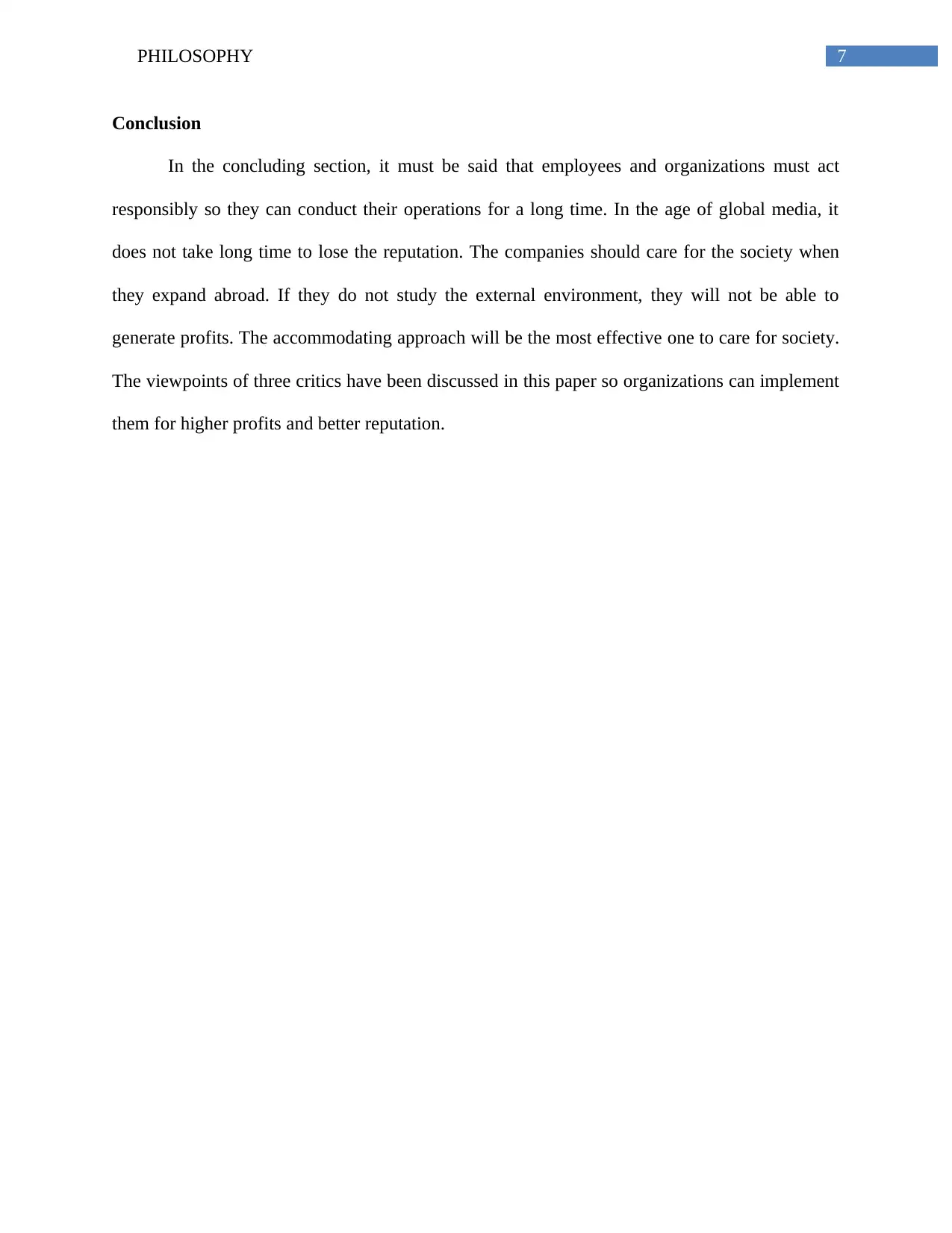
7PHILOSOPHY
Conclusion
In the concluding section, it must be said that employees and organizations must act
responsibly so they can conduct their operations for a long time. In the age of global media, it
does not take long time to lose the reputation. The companies should care for the society when
they expand abroad. If they do not study the external environment, they will not be able to
generate profits. The accommodating approach will be the most effective one to care for society.
The viewpoints of three critics have been discussed in this paper so organizations can implement
them for higher profits and better reputation.
Conclusion
In the concluding section, it must be said that employees and organizations must act
responsibly so they can conduct their operations for a long time. In the age of global media, it
does not take long time to lose the reputation. The companies should care for the society when
they expand abroad. If they do not study the external environment, they will not be able to
generate profits. The accommodating approach will be the most effective one to care for society.
The viewpoints of three critics have been discussed in this paper so organizations can implement
them for higher profits and better reputation.
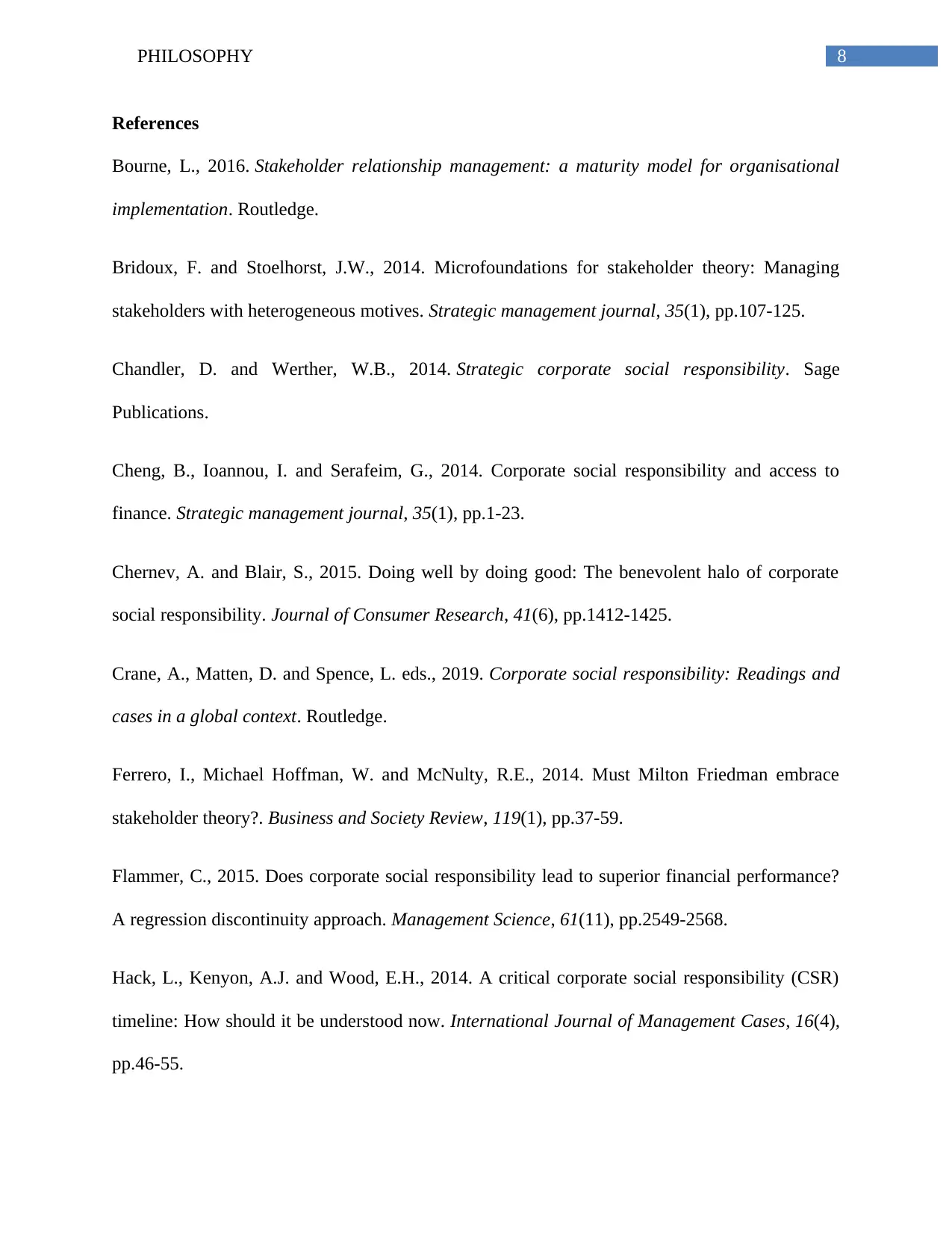
8PHILOSOPHY
References
Bourne, L., 2016. Stakeholder relationship management: a maturity model for organisational
implementation. Routledge.
Bridoux, F. and Stoelhorst, J.W., 2014. Microfoundations for stakeholder theory: Managing
stakeholders with heterogeneous motives. Strategic management journal, 35(1), pp.107-125.
Chandler, D. and Werther, W.B., 2014. Strategic corporate social responsibility. Sage
Publications.
Cheng, B., Ioannou, I. and Serafeim, G., 2014. Corporate social responsibility and access to
finance. Strategic management journal, 35(1), pp.1-23.
Chernev, A. and Blair, S., 2015. Doing well by doing good: The benevolent halo of corporate
social responsibility. Journal of Consumer Research, 41(6), pp.1412-1425.
Crane, A., Matten, D. and Spence, L. eds., 2019. Corporate social responsibility: Readings and
cases in a global context. Routledge.
Ferrero, I., Michael Hoffman, W. and McNulty, R.E., 2014. Must Milton Friedman embrace
stakeholder theory?. Business and Society Review, 119(1), pp.37-59.
Flammer, C., 2015. Does corporate social responsibility lead to superior financial performance?
A regression discontinuity approach. Management Science, 61(11), pp.2549-2568.
Hack, L., Kenyon, A.J. and Wood, E.H., 2014. A critical corporate social responsibility (CSR)
timeline: How should it be understood now. International Journal of Management Cases, 16(4),
pp.46-55.
References
Bourne, L., 2016. Stakeholder relationship management: a maturity model for organisational
implementation. Routledge.
Bridoux, F. and Stoelhorst, J.W., 2014. Microfoundations for stakeholder theory: Managing
stakeholders with heterogeneous motives. Strategic management journal, 35(1), pp.107-125.
Chandler, D. and Werther, W.B., 2014. Strategic corporate social responsibility. Sage
Publications.
Cheng, B., Ioannou, I. and Serafeim, G., 2014. Corporate social responsibility and access to
finance. Strategic management journal, 35(1), pp.1-23.
Chernev, A. and Blair, S., 2015. Doing well by doing good: The benevolent halo of corporate
social responsibility. Journal of Consumer Research, 41(6), pp.1412-1425.
Crane, A., Matten, D. and Spence, L. eds., 2019. Corporate social responsibility: Readings and
cases in a global context. Routledge.
Ferrero, I., Michael Hoffman, W. and McNulty, R.E., 2014. Must Milton Friedman embrace
stakeholder theory?. Business and Society Review, 119(1), pp.37-59.
Flammer, C., 2015. Does corporate social responsibility lead to superior financial performance?
A regression discontinuity approach. Management Science, 61(11), pp.2549-2568.
Hack, L., Kenyon, A.J. and Wood, E.H., 2014. A critical corporate social responsibility (CSR)
timeline: How should it be understood now. International Journal of Management Cases, 16(4),
pp.46-55.
⊘ This is a preview!⊘
Do you want full access?
Subscribe today to unlock all pages.

Trusted by 1+ million students worldwide
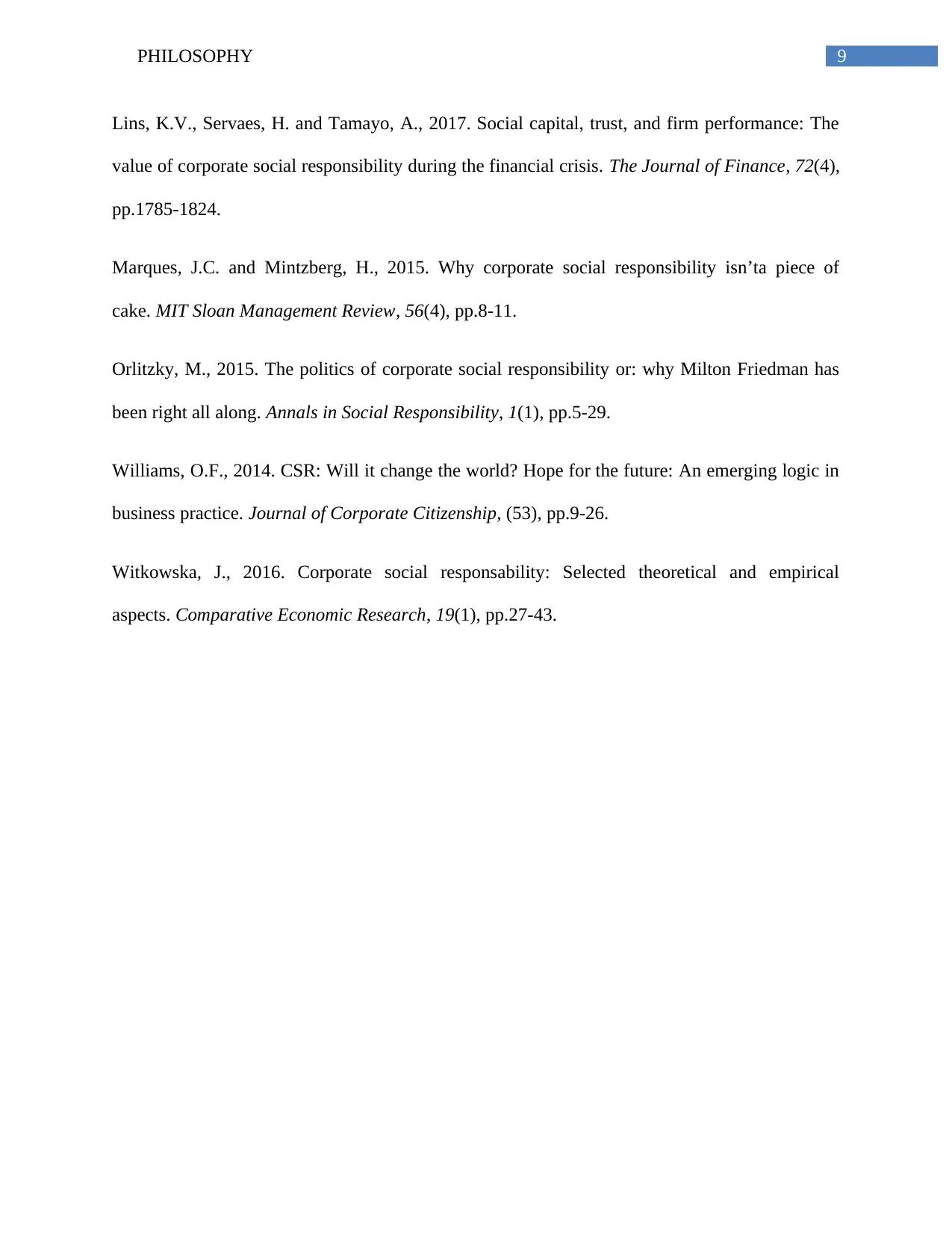
9PHILOSOPHY
Lins, K.V., Servaes, H. and Tamayo, A., 2017. Social capital, trust, and firm performance: The
value of corporate social responsibility during the financial crisis. The Journal of Finance, 72(4),
pp.1785-1824.
Marques, J.C. and Mintzberg, H., 2015. Why corporate social responsibility isn’ta piece of
cake. MIT Sloan Management Review, 56(4), pp.8-11.
Orlitzky, M., 2015. The politics of corporate social responsibility or: why Milton Friedman has
been right all along. Annals in Social Responsibility, 1(1), pp.5-29.
Williams, O.F., 2014. CSR: Will it change the world? Hope for the future: An emerging logic in
business practice. Journal of Corporate Citizenship, (53), pp.9-26.
Witkowska, J., 2016. Corporate social responsability: Selected theoretical and empirical
aspects. Comparative Economic Research, 19(1), pp.27-43.
Lins, K.V., Servaes, H. and Tamayo, A., 2017. Social capital, trust, and firm performance: The
value of corporate social responsibility during the financial crisis. The Journal of Finance, 72(4),
pp.1785-1824.
Marques, J.C. and Mintzberg, H., 2015. Why corporate social responsibility isn’ta piece of
cake. MIT Sloan Management Review, 56(4), pp.8-11.
Orlitzky, M., 2015. The politics of corporate social responsibility or: why Milton Friedman has
been right all along. Annals in Social Responsibility, 1(1), pp.5-29.
Williams, O.F., 2014. CSR: Will it change the world? Hope for the future: An emerging logic in
business practice. Journal of Corporate Citizenship, (53), pp.9-26.
Witkowska, J., 2016. Corporate social responsability: Selected theoretical and empirical
aspects. Comparative Economic Research, 19(1), pp.27-43.
1 out of 10
Related Documents
Your All-in-One AI-Powered Toolkit for Academic Success.
+13062052269
info@desklib.com
Available 24*7 on WhatsApp / Email
![[object Object]](/_next/static/media/star-bottom.7253800d.svg)
Unlock your academic potential
Copyright © 2020–2026 A2Z Services. All Rights Reserved. Developed and managed by ZUCOL.





